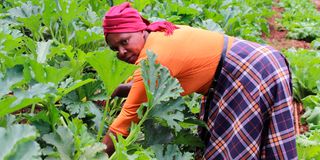African farmer groups oppose renewed chemical fertiliser push

Scolastica Wambui in her organic vegetable farm in Gakonye, Kiambu County.
African farmer groups have faulted the renewed call for more chemical fertiliser use in Africa, saying it would heighten import dependency and worsen the climate change crisis.
The groups coalescing around Alliance for Food Sovereignty in Africa (AFSA) said the just concluded negotiations at Thiès in Senegal, organised by the African Development Bank, and attended by 34 heads of state and 70 ministers deepened “colonial thinking.”
More than one in five Africans – a record 278 million people – are facing hunger, according to United Nations estimates, in the continent’s worst-ever food crisis.
At the summit, ADB President Akinwumi Adesina announced $10 billion (Sh1.2 trillion) in financial assistance to boost food production and reduce the increasing import bill over the next five years.
African leaders also committed to increase their budgetary allocation to agriculture.
Increased investment
But AFSA said in a statement that while they celebrated the increased investment and the renewed commitment of governments to allocate 10 per cent of public expenditure to agriculture, the thinking that food production can only increase through more chemical fertiliser was harmful to the continent.
“We reject the continued reliance on colonial thinking to raise production of staple crops using imported farm inputs, chemical fertilisers, pesticides, and hybrid and GMO seeds,” AFSA said in a statement.
AFSA, the largest civil society movement on the continent, brings together farmers, pastoralists, fishermen, indigenous peoples, faith groups, women's movements, youth and consumer associations in a united voice for food sovereignty.
“Food sovereignty is freedom from external control. A country dependent on imported fertilizer has lost its sovereignty as much as one that depends on food imports or donations,” it says in its latest statement.
Malnutrition
The groups note that Africa faces the triple burden of malnutrition of hunger, micronutrient deficiency, and obesity/non-communicable diseases. They added that the focus on monocrops (wheat and maize) “rejects the vast catalogue of nutritious indigenous crops and local varieties”, yet resilience comes from diversity – in crops, food sources, soil amendments, and supply chains.
“Zambia showed us the failure of hybrid monocrops, which produced back-to-back maize surpluses yet became the most undernourished country in Africa, with 40 per cent of young children stunted. In South Africa, the continent’s most industrialised country, GMO maize is the staple food, and fast food is the urban norm. Now, half of all adults are overweight (23%) or obese (27%), and NCDs like diabetes and hypertension cause life-altering illnesses, disabilities, and premature death.
AFSA is also concerned about the proposed significant increase of African land under agriculture, saying that large-scale land acquisitions often fail to gain community consent.
Acquisitions, the groups claim, also fail to compensate while forcing evictions of indigenous people, causing women’s loss of access to productive land, deforestation, loss of biodiversity, and land degradation.
AFSA is also concerned about the reliance on a top-down, public-private partnership approach to agricultural development.
“Where were the voices of African farmers and citizens at this food summit? Africa has its resources and know-how to produce healthy food using effective, low-cost, chemical-free inputs, regenerating the soil sustainably,” the statement notes.
Chemical fertilisers
AFSA General Coordinator Million Belay questions the Senegal summit’s propagation of the idea that African farmers don’t produce enough food because they don’t use enough chemical fertilisers.
“The implication is that if we pump our farms with agrochemicals, we will grow more food. Even though this might serve as a short-term strategy, in the end, it means polluting the soil, making farmers dependent on external inputs, endangering the health of farmers and consumers, robbing people of their right to healthy, culturally appropriate and nutritious food, and increasing vulnerability to climate change,” said Dr Belay.
AFSA believes that the authentic African solution is a commitment to agroecology and food sovereignty - the right to healthy and culturally appropriate food produced through ecologically sound and sustainable methods and the right to define one’s own food and agriculture systems.
“We urge policymakers, governments, and donors to provide more funding to agroecology, which offers clear solutions to nutrition challenges, the climate crisis and food insecurity,” said Mr Ferdinand Wafula, the programme coordinator at Bio Gardening Innovations, a holistic farming project in Western Kenya.
Redirect funding
AFSA calls on African governments and donors to redirect funding away from failed ‘green revolution’ approaches towards proven agroecological alternatives.
It believes uniting generations of indigenous knowledge, farmer-driven and science-based innovations, and the ecosystem’s natural processes, agroecological food systems can adapt to and help solve the climate crisis.
“Farmers, pastoralists, fisherfolk, indigenous peoples and local communities use agroecology to steward their land sustainably, produce nourishing food that celebrates cultural heritage, and strengthen local markets and economies. This way, together, we can feed Africa,” the statement notes.





